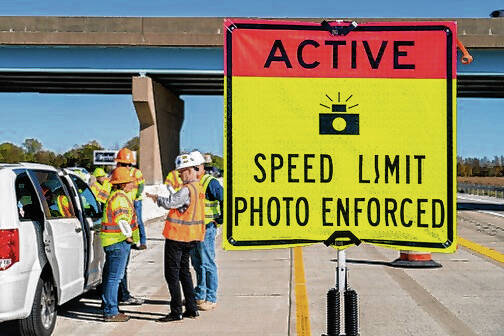A Johnson County lawmaker was among a group of state legislators who visited a speed control pilot program site Friday.
Safe Zones is Indiana’s worksite speed control pilot program. The five-year pilot program, authorized by House Enrolled Act 1015 during the 2023 legislative session, uses speed detection technology to monitor the speeds of passing vehicles, according to an Indiana Department of Transportation news release.
A group of state legislators visited the current Interstate 70 construction zone in Hancock County Friday, where the first deployment of the program is occurring. Those lawmakers were bill author State Rep. Jim Pressel, R-Rolling Prairie; bill co-author Rep. Alan Morrison, R-Brazil; Rep. Peggy Mayfield, R-Martinsville; Rep. Tonya Pfaff, D-Terre Haute; Rep. Ed Clere, R-New Albany; and Sen. Michael Crider, R-Greenfield. INDOT Commissioner Mike Smith also attended.
“From the beginning, the purpose of my legislation establishing Safe Zones has been to gather information on how to keep our roads and those working on them safe,” Pressel said in the news release. “Now, we have the opportunity to see for ourselves how this new law and the implementation of cameras in worksites impacts the overall safety of Hoosiers on roadways.”
The first Safe Zones site in Hancock County has had both a “positive impact on traffic and has kept motorists and road crews safe,” Crider said in the news release.
“As a leader on the Interim Study Committee on Roads and Transportation and the Senate Committee on Homeland Security and Transportation, it is important to me to try to keep all Hoosiers safe on our roads,” he said. “I hope motorists will continue to slow down and be more cautious in these work zones as the pilot program continues, and I look forward to seeing what else we will be able to accomplish with this new tool.”
Speed is a major factor in work zone crashes, and speeds have to be reduced to “make construction zones safer not only for road crews but also for motorists,” Smith said in the news release.
“So far, many drivers are slowing down and we hope that continues. Lives depend on it,” he said.
Over the past decade, 269 people have been killed in crashes in highway worksites or in worksite backups in Indiana. In 2023 alone, 33 people were killed and more than 1,750 were injured in INDOT work zones. Four out of five people killed in work zones are either drivers or their passengers, according to the news release.
Safe Zones aims to curb those numbers. By statute, INDOT may deploy the technology in up to four sites at any given time. Additional locations outside Hancock County will be announced as the program expands, officials say.
Here’s how the Safe Zones program works:
- Signs are posted as motorists enter and exit worksites notifying them that speed limits are being monitored by an automated system.
- The system monitors the speed of vehicles using speed timing devices as they pass through the work zone. When a vehicle is determined to be traveling 11 mph or more than the posted speed limit, the system captures an image of the vehicle’s rear license plate. After the data is validated, violations are certified and issued to the owner of the vehicle by mail.
- The pilot program began in August with a pre-enforcement period, during which drivers will receive courtesy notices but will not be fined. The pre-enforcement warning period is still in effect on I-70 in Hancock County.
- After the pre-enforcement period ends, the first violation will result in a zero-fine warning, the second in a $75 civil penalty, and every violation thereafter a civil penalty of $150. In accordance with the statute, collected fines will go into the state’s general fund.
- Workers must be present at the site at the time of the event for violations to be valid.
Similar programs in other states have significantly improved work zone safety. Two years after Maryland launched its program, speeding violations in construction sites fell more than 80%, and incidence of worksite-related crashes, fatalities and injuries were at their lowest in more than 10 years. In the first year Pennsylvania began continuously enforcing its program, it saw a more than 19% drop in worksite crashes, INDOT officials say.
INDOT will share annual reports throughout the pilot program with members of the Indiana General Assembly and the traveling public.
To learn more about Indiana Safe Zones, including active locations and answers to frequently asked questions, visit SafeZonesIN.com.





